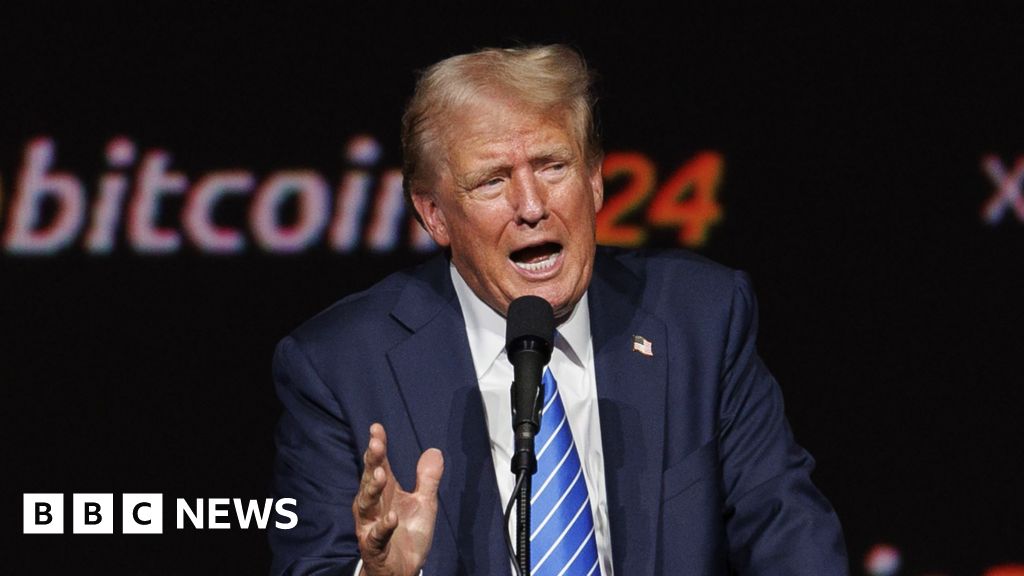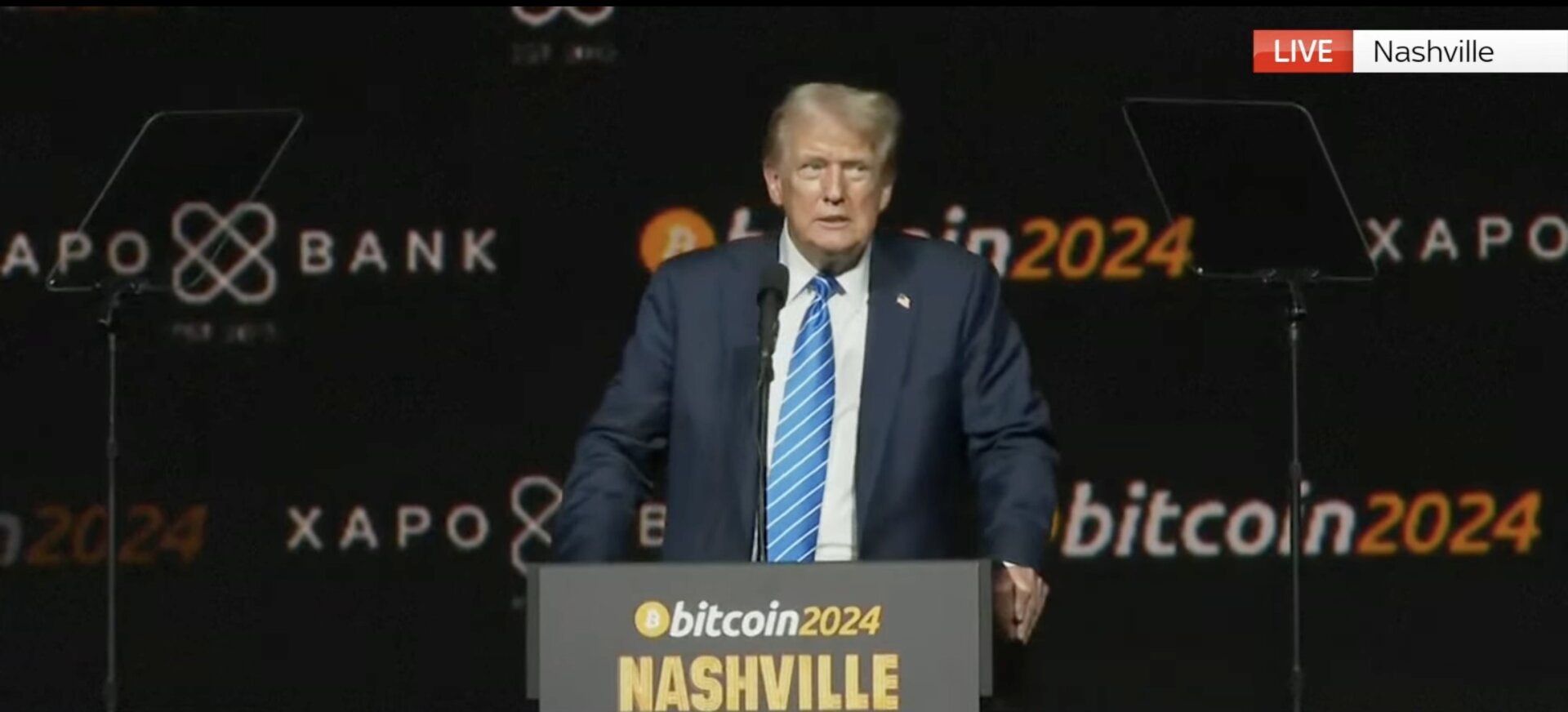Tech
The Latest Tech News in Crypto and Blockchain

Feb. 21: Fuel Labs, creator of the optimistic rollup Fuel v1, announces its evolution into the “Rollup OS, a complete operating system designed to empower Ethereum rollups and unlock their full potential,” according to the team: “Purpose-built to tackle critical limitations in existing rollups architectures, this paves the way for its Q3 2024 mainnet launch. Powered by FuelVM, the Rollup OS brings new capability to Ethereum via parallelization, state minimization, seamless interoperability and VM customisation. By introducing multiple native assets and combating state bloat, Fuel brings a new paradigm to scaling.”
Flare Claims First as ‘Compliant Decentralized Futures Protocol’
Feb. 21: Flare is joining forces with Sindric Solutions to launch XDFi, claiming it’s “the world’s first compliant decentralized futures protocol,” according to the team: “With regulatory uncertainty impeding larger-scale institutional investment in DeFi, XDFi emerges as a promising solution for major investors. The protocol’s third-party Know Your Customer tokenization (KYCT) guarantees 100% confidence in compliant futures contract transactions, ensuring all P2P matches occur between eligible counterparties.”
INIT Capital Secures $3M in Funding to Launch ‘Liquidity Hooks’
Feb. 21: INIT Capital has secured $3 million in seed funding to launch Liquidity Hooks on Feb. 28, targeting DeFi liquidity challenges. According to the team: “With the goal of evolving alongside DeFi’s rapid growth, this innovation is set to address the gap in money market architecture and user composability. With backing from top investors like Electric Capital and Mirana Ventures, INIT’s Liquidity Hooks serve as composable plugins for liquidity, allowing dApps to fully concentrate on catering yield and trading strategies for end-users.”
Protocol Village is a regular feature of The Protocol, our weekly newsletter exploring the tech behind crypto, one block at a time. Sign up here to get it in your inbox every Wednesday. Project teams can submit updates here. For previous versions of Protocol Village, please go here. Also please check out our weekly The Protocol podcast.
ZKM Launches ‘zkVM’ Alpha Testnet
Feb. 20: ZKM is launching its zero-knowledge virtual machine (zkVM) alpha testnet to open up possibilities for both blockchain and non-blockchain applications to harness the potential benefits of zero-knowledge proofs. According to the team: “The primary aim of ZKM is to establish Ethereum as the global settlement layer for secure, verifiable computing via their general purpose zkVM.”
Stellar Starts Phased Rollout of ‘Soroban’ Smart Contracts
Feb. 20: The Stellar blockchain moved forward with its “Protocol 20” upgrade, initiating phased rollout that will see the payments network add Ethereum-style smart contracts under the long-planned Soroban project. The Stellar Development Foundation, which supports the blockchain’s ecosystem, confirmed the “new era for the Stellar smart contracts tech stack” in a blog post on Tuesday, noting that the move came after validators voted for the mainnet upgrade. CoinDesk 20 asset: (XLM)
EOS Introduces Leap 6.0 Upgrade, Including Launch of ‘Savanna’ Consensus Algorithm
Feb. 20: EOS introduced the Leap 6.0 upgrade, “transforming the ecosystem with the Savanna consensus algorithm,” according to the team: “This upgrade delivers instant finality and a 100-fold transaction speed boost. Scheduled for release on July 10, it enhances security, user experience and decentralization. Infrastructure providers and partners should note key dates, with the hard fork set for July 31. Inspired by HotStuff, Savanna elevates scalability and privacy, while introducing the potential for decentralized block producers.”
Pontem Network Unveils Liquidswap, an AMM on Aptos
Feb. 20: Pontem Network, a product development studio building Move and EVM-compatible products to enable a safer, more performant and developer-friendly Web3, is unveiling Liquidswap, “the first automated market maker to offer concentrated liquidity on Aptos,” according to the team: “Since launching in stealth mode, Pontem’s Liquidswap has recorded $320M in trading volume, $32M of TVL and 700K unique addresses,” according to the team. (APT)
Humanity Protocol Emerges From Stealth, Backed by Animoca, Polygon
Feb. 20: Humanity Protocol, launched by Human Institute with Animoca Brands and Polygon Labs, emerged from stealth as a new zkEVM layer-2 blockchain for Web3 identity validation. According to a press release, the project relies on palm recognition tech “as a less invasive identity verification alternative to methods like iris scans.” The protocol was built from the chain-development kit Polygon CDK, with zero-knowledge proofs and a “Proof of Humanity” consensus mechanism. The team wrote in a message: “Founded by Terence Kwok and backed by tech leaders, it aims for an inclusive, user-centric Web3 experience. Utilizing Polygon CDK for scalability, it’s designed for diverse applications, ensuring sybil resistance and data ownership.” CoinDesk 20 asset: (MATIC)
CrossFi, With CoinList, Launches EVM Testnet
Feb. 20: CrossFi, in collaboration with CoinList, has launched its EVM testnet, marking a crucial step towards providing secure and user-friendly cross-border payments, according to the team: “The testnet, running for three months with $8.4M in MPX rewards, aims to validate CrossFi Chain’s functionality, performance and security, paving the way for its mainnet launch and redefining traditional finance with decentralized solutions.”
COTI Blockchain Unveils ‘Garbled Circuits’ as New Encryption Paradigm to Rival FHE
Feb. 20: COTI, a layer-1 blockchain, unveiled a new encryption paradigm with garbled circuits, according to the team: “This is the first time garbled circuits have been successfully deployed on the blockchain, bringing on-chain privacy with a computation speed up to 1,000 times faster than other encryption systems like fully homomorphic encryption (FHE). Garbled circuit technology is a form of multi-party computation (MPC), where specialized cryptographic methods allow a group of parties to collaborate, performing a specific computation that requires their private information, but does so without disclosing the input information to any other party.”
QED, the ‘ZK-Native’ Blockchain, Secures $3M in Funding for DeFi on Bitcoin
Feb. 20: QED, describing itself as “the world’s first ZK-native blockchain protocol,” has secured $3 million in funding, to propel DeFi on Bitcoin. According to the team: “Combining the scalability of zero-knowledge (ZK) proofs with the liquidity and security of BTC, QED supports DeFi at scale, real-time programmable NFTs, secure blockchain bridges and trustless e-commerce marketplaces. DApps built on QED can locally prove transactions, providing unlimited computation for a fixed gas fee. This innovation ensures every user’s public key functions as a custom ZK circuit, featuring ‘smart signatures’ read from state, resembling a smart contract.”
DePIN-Focused Blockchain Minima to Put Nodes on Wicrypt’s ‘Smart WiFi’ Routers
Feb. 20: Minima, a layer-1 blockchain focused on decentralized physical infrastructure network (DePIN) solutions, is partnering with Wicrypt, a smart WiFi network, according to the team. The plan is “to democratize and make internet access cheaper for everyone. Wicrypt will embed Minima nodes into WiFi routers, which will then be able to grant network access to Minima users. By running Minima nodes on Wicrypt routers, each router will become an active node, thus decentralizing and making the network’s infrastructure more secure and resilient.”
ELOOP Plans Tokenization Platform on Peaq Blockchain
Feb. 20: ELOOP, a specialist in “Machine RWAs,” running a project that tokenizes vehicles in a car-sharing Tesla fleet, announced plans for building a tokenization platform on the peaq blockchain, according to the team: “The platform will enable companies and communities to get a stake in the value generated by their machines as on-chain tokens. The tokens will generate rewards for their holders based on the real-world value created by the underlying machines: wind turbines, WiFi hotspots, shared e-scooters. The platform has garnered interest from both Web2 and Web3 projects, including Dabba, a connectivity DePIN.”
Starter Partners With Atlanta Blockchain Center, Revamping Crypto Launchpad
Feb. 20: Starter International Holdings has partnered with Atlanta Blockchain Center, revamping its acclaimed crypto launchpad to champion diversity and innovation. According to the team: “The collaboration introduces Base Chain support, aiming to fill the VC industry’s diversity gap. With a history of over 60 IDOs and $45M raised, Starter is set to bridge blockchains and communities, fostering a more inclusive blockchain ecosystem. Discover how this partnership is redefining blockchain fundraising and empowering minority founders at https://starter.xyz.”
ZKX, Decentralized Perps Exchange on Starknet, Launches ‘Pro Trade’
Feb. 20: ZKX, a decentralized perpetual futures exchange operating on Starknet, has “launched their second product, Pro Trade, a trading exchange offering advanced features, gasless transactions and exclusive $ZKX rewards, enhancing the DeFi experience for experienced traders,” according to the team: “This announcement follows Starknet Foundation’s STRK token distribution plan last week. With a shared objective of bringing more people into DeFi, ZKX is contributing by enriching the ecosystem, driving adoption and showcasing Starknet’s capabilities.”
Jumper.Exchange Launches LI.Fuel to Support Expansion of Solana-Based Stablecoin Transfers
Feb. 20: Jumper.Exchange announced that it has added support for Solana-based transfers of USDC and USDT, according to the team: “This enables swaps from any token on the Solana blockchain into USDC. To further support this expansion, Jumper.Exchange has also launched LI.Fuel, which enabled users to convert a portion of their bridged tokens into Solana in order to be able to instantly engage with Solana dApps and platforms. In addition to Solana, Jumper.Exchange currently supports USDC and USDT transfers from various EVM chains, including Ethereum, Arbitrum, Optimism, Base, Polygon, BNB Chain and Avalanche.”
Polybase Announced the Launch of Payy, a New Payment App
Feb. 20: Polybase Labs, which built an Ethereum ZK rollup blockchain with private transactions, announced the launch of Payy, a global payments app. According to the team, it takes fewer than 10 seconds to move $1 or $1B, is free and is end-to-end encrypted. “Polybase is giving away $100K at ETH Denver to celebrate the launch.”
Solana to Use Filecoin to Make Block History More Accessible
Feb. 19: The Solana blockchain has integrated with Filecoin, according to the Filecoin team: “Solana is utilizing Filecoin to make its block history more accessible and usable for infrastructure providers, explorers, indexers, and anyone needing historical access. By leveraging Filecoin’s decentralized storage capabilities, Solana can achieve data redundancy, scalability, and enhanced security while staying true to its decentralized ethos.” CoinDesk 20 assets: (SOL) (FIL)
Trust Wallet Launches ‘SWIFT’ Smart-Contract Wallet With Biconomy
Feb. 19: Trust Wallet, a self-custody wallet, has launched SWIFT, a smart-contract wallet, in collaboration with Biconomy. According to the team, the launch “marks a significant industry shift by redefining Web3 accessibility for 80 million users. SWIFT’s integration of Account Abstraction technology simplifies setup, enhances security with biometric Passkeys, and ensures seamless gas fee management. With features like one-click transactions and support for 200+ tokens, SWIFT sets a new standard for user-centric web3 wallets.” The collaboration “leverages Biconomy’s innovative Paymaster and Bundler infrastructure.”
ZkSync’s ZeroLend to Launch Native Governance Token ZERO
Feb. 19: ZeroLend, the second-largest protocol on zkSync, is set to launch its native governance token ZERO in Q1 2024. This comes on the back of a $3 million seed round. The DeFi protocol has observed 1,000% growth in TVL from $3 million to $40 million in the past few months as users searched for new potential airdrops and interacted with zkSync-based platforms.
AltLayer, Platform for Launching Rollups, Raises $14.4M From Polychain, Hack VC
Feb. 19: AltLayer, an open and decentralized protocol to launch native and restaked rollups with optimistic and ZK stacks, has raised $14.4 million in a strategic fundraising round co-led by Polychain Capital and Hack VC, according to the team: “The company eyes global team expansion amidst the growing number of strategic partnerships and key projects in development, centered around our infrastructure innovation of restaked rollups.”
Y Combinator, Startup Incubator Behind Airbnb, Coinbase, and Stripe, Looks to Invest in Stablecoin Finance
Feb. 19: Y Combinator, the Silicon Valley incubator, has listed stablecoin finance as a category in its new and updated list of areas it would like to deploy funds in, according to its request for startups (RFS) list released last week.
BNB Chain Releases Report on Its History
Feb. 19: BNB Chain released the “BNB Chain & the Web3 Blueprint” brand story report analyzing the “advancements, use cases,and impact across its three community-led blockchains,” according to the team: “It also delves into its history and journey from BSC’s inception in 2017 as Binance Chain, its evolution to Binance Smart Chain and eventual emergence as BNB Smart Chain, one of the most popular layer-1 (L1) ecosystems in the world, averaging in excess of 1M DAU, and opBNB.”
Wormhole Foundation Collaborates With Succinct on ‘ZK Light Client’
Feb. 18: Wormhole Foundation, which supports teams building products for the cross-chain messaging protocol Wormhole, said in a blog post that it’s “collaborating with the team at Succinct to build an Ethereum ZK light client as part of an ongoing effort to further decentralize message verification within the Wormhole platform. Wormhole ZK is being leveraged by developers to minimize trust in the Wormhole platform, improve cross-chain composability and increase network security. Read more about the vision of Wormhole ZK in the recently announced ZK roadmap.”
Justin Sun Tweets Tron DAO’s Roadmap for Bitcoin Layer-2
Feb. 16: TRON DAO, the decentralized autonomous organization (DAO) behind the TRON network, with over 210 million user accounts, has unveiled its roadmap for building an innovative Bitcoin layer-2 solution, according to a tweet from Tron founder Justin Sun. “This solution will revolutionize how we think about blockchain interoperability and using stablecoins within the Bitcoin ecosystem,” according to a message from the team. “Let’s make #Bitcoin fun again!” Sun wrote. (TRX)
Silencio, Decentralized Network to Use Smartphones as Noise-Pollution Sensors, Raises $1M
Feb. 16: Silencio, a decentralized network of smartphones working as noise-pollution sensors, has closed a $1M funding round led by Borderless Capital, a leading investor in the DePIN space, according to the team: “Along with Borderless Capital, funding from Moonrock Capital, Master Ventures, and others will be used to expand and enhance its community-driven noise pollution sensor network, improve data integrity for well-being, and support strategic initiatives. This investment marks a significant milestone for Silencio as it sets out to redefine data coverage through the integration of peaq, the layer-1 blockchain for real-world apps.” Silencio selected peaq’s network last year as its layer-1 blockchain.
Subsquid Joins Google BigQuery for Multi-Chain Projects
Feb. 16: Subsquid, a peer-to-peer network to batch query and aggregate data, has joined Google’s BigQuery for multi-chain projects to leverage Subsquid with BigQuery to quickly analyze their usage on different chains and gain insights into fees, operating costs and trends, according to the team: “Subsquid indexing has supported over $11 billion in decentralized applications and L1/L2 value, with 30,000 participants, including tens of thousands of developers, deploying over 40,000 indexers.”
RW3, Blockchain-Focused VC Led by Pete Najarian, Raises $80M
Feb. 15: RW3 Ventures raised $60 million for RW3 Ventures Fund I LP, according to the team: “The fund will target investments in early-stage blockchain and Web3 companies, with an emphasis on teams that seek to utilize blockchain technology to disrupt real-world industries and business models with sizable addressable markets. The round was led by The Raptor Group and Mubadala Capital, the wholly-owned asset management subsidiary of Mubadala Investment Company, a global sovereign investor headquartered in Abu Dhabi. RW3 is led by Pete Najarian and Joe Bruzzesi, two well-known figures in the digital asset space.”
Blueprint Finance Emerges With $7.5M of Funding, Concrete Protocol
Feb. 15: Blueprint Finance announced that it’s emerging from stealth with $7.5 million in funding from crypto-native investors including Tribe Capital, Hashed, Portal Ventures, SALT and others – to solve crypto’s liquidation problem. According to the team: Blueprint’s flagship product is the Concrete Protocol, an appchain purpose-built for on-chain debt and credit. Concrete powers higher yields, liquidation protection, and advanced predictions across all of DeFi, starting with money markets.”
QuickNode Adds Support for ZkSync Hyperchains
Feb. 15: QuickNode, a Web3 development platform, now supports zkSync hyperchains,” enhancing its custom chains offering for clients seeking fast and scalable ZK technology,” according to the team: “Hyperchains, powered by ZK Stack, ensure robust data privacy, ideal for enterprise use cases while maintaining compliance. They run parallel to zkSync mainnet, enabling seamless asset bridging and liquidity flow. With QuickNode handling infrastructure, businesses can focus on creating plug-and-play blockchain applications.”
Lava, Cosmos-Based Appchain, Raises $15M, Plans Mainnet Launch
Feb. 15: Lava, an application-specific proof-of-stake blockchain built using Cosmos SDK, has raised a $15 million seed round, led by Tribe, Jump and Hashkey Capital, according to the team: “Mainnet is launching end of Q1/early Q2. Lava’s vision is to build a modular data access layer for Web3, enabling developers to easily build apps on any chain or rollup. Lava has been uniquely designed for technical and non-technical users to contribute to scaling the network and is launching a points system to reward users.”
Injective Adds Mainnet Support for Solana Domain-Name Bridging With Wormhole
Feb. 15: Injective, a blockchain designed for finance built using Cosmos SDK, now supports “an interoperable domain name service (DNS) on mainnet: Solana domain-name bridging with Wormhole (previously available on testnet). The cross-chain integration further converges the Web3 and Web2 experience by letting users leverage single domain names like on Web2 when conducting transactions, and represents a major achievement in ecosystem collaboration, including Bonfida and Wormhole. More details from Injective and Bonfida. Injective’s infrastructure features a unique two-way cross-chain interaction facilitated by Wormhole. This results in a more efficient and streamlined domain service experience when SNS transactions are initiated. Adoption is simple: users can purchase .sol domains plus use both .sol and .inj domains across Injective dApps, further expanding the cross-chain domain experience.” (INJ)
Helika, Data Analytics Provider for Web3 Gaming, Raises $8M From Pantera, Animoca, Diagram, Sfermion
Feb. 15: Helika, a data analytics and infrastructure provider for traditional and Web3 gaming with customers like Animoca Brands and Yuga Labs, is announcing the completion of an $8 million Series A fundraising from Pantera, Animoca, Diagram and Sfermion. According to the team: “This funding will help Helika advance its AI-powered suite of products and services, which currently aggregates data across multiple chains, social media platforms, and games and synthesizes that data into actionable insights for gaming studios to leverage in user acquisition, retention, and engagement to ultimately drive profits.”
Tech
The Information Hires Peterson to Cover Tech, Finance, Cryptocurrency

My life is nice
Tech news site The Information has hired Business Insider actress to cover technology, finance and cryptocurrencies.
She was part of Business Insider’s investigative team. She was also previously a corporate technology reporter and a technology deals reporter.
Peterson has been with Business Insider since June 2017 and is based in the San Francisco office.
She previously worked for Folio as an associate editor. She holds a bachelor’s degree from the University of California-Davis and a master’s degree from New York University.
Chris Roush
Chris Roush is the former dean of the School of Communications at Quinnipiac University in Hamden, Connecticut. Previously, he was the Walter E. Hussman Sr. Distinguished Professor of Business Journalism at UNC-Chapel Hill. He is a former business reporter for Bloomberg News, Businessweek, The Atlanta Journal-Constitution, The Tampa Tribune, and the Sarasota Herald-Tribune. He is the author of the leading business journalism textbook, Show Me the Money: Writing Business and Economics Stories for Mass Communication, and of Thinking Things Over, a biography of former Wall Street Journal editor Vermont Royster.
Tech
Trump Courts Crypto Industry Votes, Campaign Donations

About the article
- Author, Brandon Livesay
- Role, BBC News
-
July 27, 2024
Donald Trump said at one of the biggest cryptocurrency events of the year that if he is re-elected president, he will fire the chairman of the U.S. Securities and Exchange Commission (SEC) on his first day.
On Saturday, Trump was the keynote speaker at Bitcoin 2024, a gathering of industry heavyweights in Nashville, Tennessee.
The Republican presidential candidate used the event to woo voters and encourage the tech community to donate to his campaign.
Cryptocurrencies have emerged as a political battleground for Republicans, with Trump saying that the Democratic Party and Vice President Kamala Harris were “against cryptocurrencies.”
The crowd was at its most animated when Trump declared, “On day one, I will fire Gary Gensler,” the SEC chairman appointed by now-President Joe Biden. The crowd applauded loudly and began chanting “Trump” at this statement.
SEC files charges against ‘Cryptocurrency King’ Sam Bankman-Frittosentenced to 25 years for stealing billions of dollars from customers of his cryptocurrency exchange FTX.
Speaking for about 45 minutes, Trump outlined some of his ideas for the industry if he wins the November election. He said he would make the United States the crypto capital of the world. His support for the sector is a 180-degree reversal from his comments in 2021, when he told Fox Business he saw Bitcoin as a “scam” that influence the value of the US dollar.
Trump told the crowd at the event that he would retain 100% of the Bitcoin currently owned or acquired by the U.S. government, adding that it would be a “national stockpile of Bitcoin.”
The former president also said he would “immediately appoint a presidential advisory council on Bitcoin and cryptocurrencies.”
He talked about the power needed to mine cryptocurrencies. “It takes a lot of electricity,” he said, adding that he would build power plants “to do that” and that it would “use fossil fuels.”
In recent months, some tech leaders have seen growing support for Trump’s presidential campaign. Tesla founder Elon Musk, who is the world’s richest person, has backed Trump. And cryptocurrency moguls the Winklevoss twins, who attended his speech on Saturday, have also come out in support.
Trump noted that his campaign accepts cryptocurrency donations, saying that in the two months since allowing cryptocurrency transactions, he has received $25 million (£20 million) in donations. However, he did not say how much of the payments came from cryptocurrency.
Trump used his speech to frame cryptocurrency regulation as a partisan issue, saying the Biden administration was “anti-crypto.”
Several Republican lawmakers also attended Trump’s speech, including Senators Tim Scott and Tommy Tuberville. Former Republican presidential candidate and Trump ally Vivek Ramaswamy was also in attendance.
The event was also attended by independent presidential candidate Robert F Kennedy Jr. and Democratic Party congressmen Wiley Nickel and Ro Khanna.
Earlier, during Bitcoin 2024, Democratic Congressman Nickel said that Kamala Harris was taking a “forward-thinking approach to digital assets and blockchain technology.”
Tech
WazirX Crypto Exchange Hack and Its Bounty Program: What Does It Mean for Crypto Investors in India?

On July 18, India Cryptocurrency exchange WazirX has been hit by a cyber attack which resulted in the loss of over $230 million worth of digital assets from one of its wallets. The exchange responded by suspending regular trading and reporting the incident to Indian authorities and other cryptocurrency exchanges. The company also launched two reward programs for ethical hackers who can help the exchange trace, freeze, and recover stolen funds.
WazirX said there was a cyberattack on a multi-signature wallet operated through a digital asset custodian service known as Liminal. Multi-signature wallets have a built-in security feature that requires multiple parties to sign transactions.
“The impact of the cyberattack is over $230 million on our clients’ digital assets,” WazirX said in a blog post, adding that INR funds were not affected. The company has firmly denied that WazirX itself was hacked and has brushed aside rumors that it was tricked by a phishing attack.
The exchange also noted that it was “certain” that its hardware keys had not been compromised, adding that an external forensic team would be tasked with investigating the matter further.
But Liminal, after completing its investigation, said: “It is clear that the genesis of this hack stems from three devices compromised by WazirX.”
Meanwhile, WazirX founder and CEO Nischal Shetty said that the attack would have been possible only if there were four points of failure in the digital signature process.
Who is behind the cyber attack?
WazirX has not yet disclosed the suspected parties or perpetrators responsible for the hack. However, news reports have emerged that North Korean hackers were responsible for the incident.
On-chain analytics and other information indicate “that this attack was perpetrated by hackers affiliated with North Korea,” blockchain analytics platform Elliptic said.
In response to The Hindu’s questions to WazirX about the North Korean hackers, cryptocurrency exchange WazirX directed us to its blog and said it was working with law enforcement to investigate whether a known malicious group was behind the attack.
“This incident affected the Ethereum multisig wallet, which consists of ETH and ERC20 tokens. Other blockchain funds are not affected,” WazirX said in its official blog, specifying that approximately 45% (according to preliminary work) of cryptocurrencies were affected by the attack.
The company largely placed the blame on the process of securing Ethereum multisig wallets and said that the vulnerability was not unique to WazirX.
How important is WazirX in the cryptocurrency industry?
WazirX calls itself India’s largest cryptocurrency exchange by volume. As of June 10, it reported total holdings of ₹4,203.88 Crores, or 503.64 million USDT. Tether [USDT] It is a stablecoin, that is, a cryptocurrency pegged to the value of the US dollar, but it is not an official currency of the United States.
When The Hindu tried to access WazirX Public and Real-Time Reserve Proof After the hack, we were greeted with a notice that the page was under maintenance.
WazirX has received both positive and negative reviews in India. The Enforcement Directorate froze the exchange’s assets in 2022, criticizing its operating procedures and lax Know-Your-Customer (KYC) and Anti-Money Laundering (AML) regulations.
“By encouraging obscurity and adopting lax AML norms, it has actively assisted around 16 accused fintech companies in laundering proceeds of crime using the cryptocurrency route. Accordingly, equivalent movable assets amounting to Rs 64.67 Crore in possession of WazirX have been frozen under the PMLA, 2002,” the ED said in a statement.
What will happen to WazirX assets?
It is unlikely that the stolen WazirX assets will be fully recovered anytime soon. This is due to the very nature of cryptocurrency, where assets can be easily mixed, transferred, converted, and sent to anonymous wallets. The chances of asset recovery are even slimmer if it is confirmed that North Korean hackers are behind the incident.
CEO Shetty said on X on July 22 that “small” portions of the stolen funds had been frozen, but declined to provide further details. He added that the majority of the funds had not been moved from the attacker’s wallet.
In recent years, North Korean hackers have stolen billions of dollars in cryptocurrency, aiming to circumvent various financial and economic sanctions.
WazirX is currently working to resume normal operations and has planned to launch an online survey to decide how to resume trading on the platform.
While the Indian exchange has defended its security practices and highlighted the challenges facing the cryptocurrency industry as a whole, savvy crypto traders will be looking for action plans and accountability, rather than emotional reassurance.
What does your rewards program consist of?
WazirX has announced two bounty programs: one to gain more information about stolen funds, and the other to recover them. Both programs are open to everyone except WazirX employees and their immediate family members.
Under the first program, WaxirX will reward up to $10,000 to anyone who can provide the exchange with information that can help freeze the funds. If the bounty hunter is unable to freeze the funds on their own, they should work with WazirX by providing enough evidence to facilitate the process.
But “if the participant fails to freeze and/or does not cooperate with WazirX to facilitate the freezing of funds, then the participant will not be entitled to any rewards,” the exchange said.
The second program, called White Hat Recovery, is aimed at recovering funds. Participants are offered 10% of the amount recovered as a white hat incentive.
“This reward will be paid only after and subject to the successful receipt of the stolen amount by WazirX. The above rewards will be payable in USDT or in the form of recovered funds at the sole discretion of WazirX,” the exchange noted.
The bounty programs are expected to last for the next three months.
This is a Premium article available exclusively to our subscribers. Read over 250 premium articles each month You have exhausted your limit of free articles. Support quality journalism. You have exhausted your limit of free articles. Support quality journalism. X You have read {{data.cm.views}} of {{data.cm.maxViews}} free articles. X This is your last free article.
Tech
Trump Vows to Make US ‘Crypto Capital of the Planet and Bitcoin Superpower’

Speaking to a crowd of supporters at the Bitcoin 2024 Conference in Nashville, Tennessee, former President and Republican candidate Donald Trump said that if elected, he would make the United States the “crypto capital of the planet and a Bitcoin superpower.”
Trump added that he would “appoint a Presidential Advisory Council on Bitcoin and Cryptocurrencies,” which would have 100 days to “design transparent regulatory guidance that will benefit the entire industry.”
Trump has publicly opposed cryptocurrencies until recently. His latest statements serve as a rallying cry for a tech industry that has long called for more flexible regulatory oversight.
Shortly after taking the stage, Trump spent several minutes naming some of the conference attendees, at one point describing Winklevoss Twins Cameron and Tyler as “male role models with big, beautiful brains.” The former president has continued to speak out against electric car mandates and called for more fossil-fuel burning power plants.
Trump also said he would order the United States to withhold all Bitcoin it currently owns “in the future.” The U.S. government reportedly holds billions of dollars in Bitcoin.
About three years ago, Trump called Bitcoin “a fraud“that is “competing against the dollar.” In February 2024, the former president said that establishing a central bank digital currency would represent a “dangerous threat to freedom.” Yet, in May, Trump declared that he was “good with [crypto]“, adding, “if you’re pro-cryptocurrency you’d better vote for Trump.” That same month, he said he would commute with the Silk Road founder Ross Ulbricht’s Sentencingand his campaign said it would accept cryptocurrency donations.
Recent comments from Trump and independent presidential candidate Robert F. Kennedy Jr. have helped make cryptocurrency regulation a major political issue in the 2024 U.S. presidential election. This comes as the SEC intensifies its scrutiny of the cryptocurrency industry. SEC Chairman Gary Gensler, appointed by President Joe Biden, called the activity “full of fraud, scams, bankruptcies and money laundering.” Trump drew applause at the conference after promising to “fire” Gensler. (U.S. presidents have the power to appoint the heads of many federal commissions, including the SEC.)
With Biden out of the raceVice President Kamala Harris’s campaign advisers have He is said to have contacted to cryptocurrency leaders in an effort to “reset” relations with the industry. Harris’s campaign has not yet said whether her stance on the industry differs from Biden’s.
-

 Altcoins10 months ago
Altcoins10 months agoAltcoins Are Severely Undervalued, Awaiting Ethereum Move | Flash News Detail
-

 News10 months ago
News10 months agoAI meme Raboo and crypto newbie ZRO
-

 Tech1 year ago
Tech1 year agoThe Latest Tech News in Crypto and Blockchain
-

 Altcoins10 months ago
Altcoins10 months agoAltcoins Correct Amid ETH Decline, Grayscale Outflows | Flash News Detail
-

 DeFi10 months ago
DeFi10 months agoIf You Missed BONK and PEPE This Year, This Viral New Crypto Might Be Your Salvation
-

 DeFi10 months ago
DeFi10 months agoIf You Missed BONK and PEPE This Year, This Viral New Crypto Might Be Your Salvation
-

 News11 months ago
News11 months agoDonald Trump vows to make the US a ‘Bitcoin superpower’ and create a national stockpile of tokens
-

 Tech11 months ago
Tech11 months agoLogan Paul Offers Partial Refund for Failed CryptoZoo Game
-

 Altcoins10 months ago
Altcoins10 months agoAltcoins set to make new crypto millionaires during summer rally
-

 DeFi1 year ago
DeFi1 year ago🪂EigenLayer Airdrop Claims Go Live
-

 DeFi1 year ago
DeFi1 year ago🥛 The “war on DeFi” continues ⚔️
-

 Videos1 year ago
Videos1 year agoLIVE FOMC 🚨 Could be CATASTROPHIC for Altcoins!












